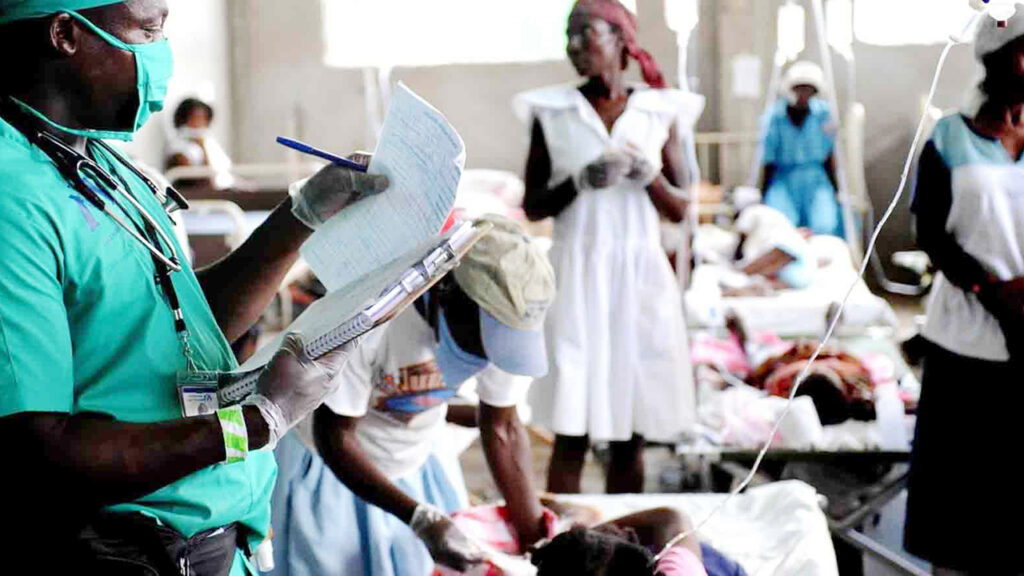 Following the ban placed on the manufacture, distribution and sale of alcoholic beverages in sachets and PET bottles by the National Agency for Food and Drug Administration and Control (NAFDAC), PAUL ADUNWOKE, looks at the arguments for and against the policy in this report.
Following the ban placed on the manufacture, distribution and sale of alcoholic beverages in sachets and PET bottles by the National Agency for Food and Drug Administration and Control (NAFDAC), PAUL ADUNWOKE, looks at the arguments for and against the policy in this report.
Carrying different placards with inscriptions such as ‘NAFDAC, don’t turn us to kidnappers’, ‘NAFDAC is working against the Nigerian government and workers’, ‘Sachet and bottle drinks are not the problem, regulation and poor implementations are the problems’, among others, members of Distillers and Blenders Association of Nigeria have been protesting nationwide against the ban placed on the manufacture, distribution and sale of alcoholic beverages in sachets and PET bottles by the National Agency for Food and Drug Administration and Control (NAFDAC).
Recently, members of the union took to the streets of Ota in Ado-Odo Ota Council of Ogun State. The protesters moved from their factories along the Sango-Agbara road to the palace of the Olota of Ota, Oba Adeyemi Obalanlege, calling on the monarch to intervene and ask the government to rescind the ban.
Members of the Food, Beverage and Tobacco Senior Staff Association of Nigeria have also given NAFDAC 14 days to reverse its ban on sachet alcohol. The association, an affiliate of the Trade Union Congress (TUC), issued the threat during a protest at the NAFDAC headquarters in Abuja. Members of the association threatened to sustain protests across the agency’s offices nationwide if nothing is done about it.
The National President of the association, Jimoh Oyibo, led the protest and submitted a letter containing the demands of the union. According to Oyibo, the ban hurts the union, as most of its members work in the distilling and blending companies.
On February 1, NAFDAC started the enforcement of the ban on alcoholic beverages in sachets and glass bottles of 200ml and below. The Director General of NAFDAC, Prof. Christianah Mojishola Adeyeye, said this decision was based on recommendation of a high powered committee of the Federal Ministry of Health and NAFDAC on one hand, the Federal Competition and Consumer Protection Commission (FCCPC), and the Industry represented by the Association of Food, Beverages and Tobacco Employers (AFBTE), Distillers and Blenders Association of Nigeria (DIBAN), in December 2018.
She said as commitment to the decision reached at the end of this committee meeting, producers of alcohol in sachets and small volume agreed to reduce the production by 5 per cent with effect from January 31, 2022 while ensuring the product is completely phased out in the country by January 31, 2024.
On the part of the agency, she said NAFDAC is committed to ensuring that the validity of renewal of already registered alcoholic products in the affected category does not exceed the year 2024.
Adeyeye noted that people who are mostly at risk of the negative effect of consumption of the banned pack sizes of alcoholic beverages are the under-aged and commercial vehicle drivers and riders.
She explained that the World Health Organisation (WHO) has established that children who drink alcohol are more likely to: use drugs, get bad grades, suffer injury or death, engage in risky sexual activity, make bad decisions and have health problems.
She noted that WHO also stated that harmful consumption of alcohol is linked to more than 200 health conditions including infectious diseases (tuberculosis and HIV/AIDS) and non-communicable conditions, liver cirrhosis and different types of cancer, adding that it is also associated with social problems such as alcohol addiction and gender-based violence.
Adeyeye stated that to curb menace of abuse of alcohol, WHO recommended some actions and strategies to policymakers that have shown to be effective and cost efficient, which include, regulating the marketing of alcoholic beverages, in particular to younger people, and regulating and restricting the availability of alcohol.
She said NAFDAC was established by Act Cap N1 Laws of the Federation of Nigeria 2014 to regulate and control the manufacture, importation, exportation, advertisement, distribution, sale and use of food, drugs, cosmetics, medical devices, bottled water, detergent and chemicals referred to as regulated products.
Adeyeye explained that alcoholic drinks in sachets, PET and glass bottles are pocket-friendly and can easily be carried around by the under-aged, including primary and secondary school children, without notice. It is easily affordable and comes handy for commercial bus drivers, keke riders, okada riders, among others, who after taking them constitute a nuisance to the society.
Although, the Director General of MAN, Mr. Segun Ajayi-Kadir corroborated the agreement reached by a tripartite committee established in 2018 by the Federal Ministry of Health to halt the production of alcohol in sachets and PET bottles of less than 200ml, effective January 31, 2024, he noted that when NAFDAC initially proposed the ban, critical stakeholders, including key members of the Distillers and Blenders Association of Nigeria (DIBAN), expressed reservations in a letter dated November 6, 2018.
He mentioned that the contents of the letter included that the assertion attributing the alleged increase in the use of hard drugs to the production and sales of alcoholic drinks in sachets and small PET bottles is incorrect, as no scientific or other studies have proven this claim.
He stated: “It must be explicitly stated: moderation and responsible drinking promote good health. Small is good, if you buy small you will consume small. If you buy big you will consume big; this is not healthy.
“To go ahead with the policy based on perceived danger, without empirical information and not minding the consequences is unfair to the industry operators, the thousands of workers that will lose their jobs and inimical to the Nigerian economy.”
Ajayi-Kadir emphasised the importance of government efforts and assistance, advocating for increased activities and support in the form of access control and stricter regulations. He cautioned against implementing a ban, which he believed would be counterproductive.
While some of those who spoke to The Guardian said the ban by NAFDAC would stifle the economy, arguing that many workers would be laid off and turned into the over saturated labour market whereas there is no proof that children have access to these sachet drinks, others held a contrary view and gave thumbs up to NAFDAC.
Calling on NAFDAC to carry out investigations on the number of children who have been affected by this sachet drink, one of the sources asked rhetorically: “How many children have money in this economy again? How many parents still give their children pocket money?”
During one of the protests in Lagos, a protester claimed that the heaviest consumers of sachet alcoholic drinks are adults who cannot afford the increasing prices of other alcoholic drinks. “Go to parks, everywhere; it is adults who drink sachet alcohol for economic purposes,” the protester said.
Treasurer, Distillers and Blenders Association of Nigeria (DIBAN), Umoren Akpan, agreed with NAFDAC that children should not have access to alcoholic beverages or by any means drink alcohol, but argued that the government can achieve that without hurting manufacturers and employees in the sector.
Noting that DIBAN as an association is very clear on that, he said: “In fact, within the last five years, we had spent well above N1 billion to promote various messaging on responsible drinking through campaigns on radio, billboards, bus branding and other forms of messaging to address children, their guardians, wholesalers, retailers and other trade partners.

“We strongly believe that we can have a win-win situation in this process without hurting our children and also preserve businesses and millions of jobs. Access control and other forms of regulatory control should be strictly applied, as is the practice in other countries instead of an outright ban with its negative implications.
“We are ready to work with the government to restrict areas where alcohol is being sold thereby limiting children’s access to it. The Nigerian economy is predominantly a sachet economy due to the low disposal income of Nigerians.
“There is no food packaging today that doesn’t come in sachets and small volume packages; the wines and spirit are therefore not different. Nigerians cannot simply afford the big packages of our brands. We therefore seek the government’s intervention to sustain our businesses and employment and help strengthen regulatory compliance and appropriate access control measures to eliminate access to our young children. This will definitely give us a win-win situation.”
For the National President, Food Beverages and Tobacco Senior staff Association (FOBTOB), Mr. Jimoh Oyibo, “the survival of the chicken is dependent on the mother chicken.”
He added: “If you kill the mother chicken, who takes care of the child? The source where the families get money to take care of children is from working for these companies. Over five million Nigerians will be affected. It is not that manufacturers are not concerned about the health of the children; far from it. What we are saying is that while we are looking at the health of the children, we must also be concerned about the business which sustains families. We should not kill one for the other. The manufacturers should partner with NAFDAC to educate all stakeholders while pursuing access control. Adults who choose to drink should consume it responsibly. Let’s not sacrifice one for the other.”
The secretary of the International Distillers Branch of DBAN, Geoffrey Igain, who spoke on behalf of the association during one of its protests, noted that over 500,000 people would be out of jobs with the ban, stressing that such a ban could lead members of the association into crime.
Igain said: “The question we keep asking the NAFDAC DG is: Are sachet drinks the problem of this country at the moment? NAFDAC should take up its responsibility of advocacy rather than clamping on indigenous businesses, especially now that Nigeria’s economy is volatile. We do not want to be jobless; that is why we are out here protesting the closure of our factories.”
He urged that instead of a ban, regulations and access control measures should be put in place. These measures, he said, could include the establishment of licensed liquor stores or outlets by local government councils nationwide.
The Vice Chairman of the Lagos Chapter of Trade Union Congress (TUC), Idogen Emmanuel, said since the commencement of the ban and seal of companies producing alcoholic beverages in sachets and PET bottles, many of its members had been forced to sit at home, stressing that the implementation may result in job loss.
Emmanuel said: “Last Thursday (February 15), NAFDAC moved to go and seal up all our companies producing sachet drinks, forgetting that the economy is so tense and harsh and they want to throw millions of people back into the labour market. The excuse of NAFDAC is that small children consume these sachet drinks but it is boldly written on all our sachet drinks that it is meant for persons aged 18 and above.
“We are battling with the hardship occasioned by the fuel subsidy removal and dollar floating as manufacturers and now the government just decided to seal up companies because they said small children are consuming it (alcohol). It is an aberration.
“We are appealing to NAFDAC to reopen these companies so that we can come to a roundtable and look for a way forward. If they feel that we are not doing enough to sensitise the public, retailers and wholesalers on the need for them not to sell to children, we are ready to do more but it is wrong to close the companies at this time that the economy of the nation is unstable.”
Toeing the same line of argument, a member of the House of Representatives, Paschal Agbodike, recently moved a motion during plenary urging the House to probe the ban placed on alcoholic beverages in sachets and small bottles by the NAFDAC. In his motion, the lawmaker said the “decision to ban the registration of beverages in small sachets and bottles runs counter to the spirit and letter of the Constitution and is against the Economic Recovery Plan of the current administration.”
However, speaking to the motion, another lawmaker, Olamide Osoba, noted that the ban is within the mandate of NAFDAC, saying the agency is empowered to regulate food and drugs in the country and that the decision was in line with global best practices.
Health experts have also insisted that alcohol consumption among underage children would jeopardise their future including exposure to different health challenges.
The Chief Medical Director (CMD), Lagos State University Teaching Hospital (LASUTH), Ikeja, Lagos, who is an Obstetrician and Gynaecologist, Prof. Adetokunbo Fabamwo, noted that alcohol intake by underage children has huge socio-economic implications, however called for stiffer regulations, saying banning of sachet alcohol would not prevent children from having access to alcohol.
He said there should be proper regulations in beer parlours, restaurants, among others, as it is done abroad so that underage will not have access to alcohol. “I am not sure that this regulation is in place in this country,” he quipped.
He said it is bad enough for even adults to engage in excessive alcohol intake. “But when one talks about underage children engaging in alcohol intake, those who are supposed to be in school, it causes huge socio-economic implications,” he said.
Fabamwo said the health implication in children is the same with adults who engage in excessive alcohol intake such as chronic alcoholic, organ damage, especially liver damage.
“Drunkenness is not a good state because it will affect the child’s thinking ability and the performance in school is going to reduce,” he noted.
He urged parents to keep their eyes on their kids and check their pockets and bags from time to time.
“Parents should smell the mouths of their children and when you suspect that your child is keeping a bad company, take a more critical look at him or her, especially those at boarding schools,” he added.
Fabamwo advised parents to check their children by paying them unannounced visits to find out what they are doing, noting that when children discover that they are being monitored, they behave themselves.
“I will advise that people who feel that they should take alcohol should be moderate; they should not take the influence of a third party and take more than their capacity,” he added.
Resident psychiatrist and behavioural scientist at LASUTH, Dr. Folashade Umukoro, said underage alcohol consumption is a global challenge.
Umukoro said the use of alcohol and other psychoactive substances is a multi-factorial one that includes genetics, biological, social, personality factors and among others.
“From research, the social factors take priority for the risk of the use of these substances in children,” he said.
The physician stated that the health implications of the use of alcohol by underage children include but not limited to the central nervous system depression leading to slowing down of brain growth, which will eventually lead to cognitive impairment.
She said most times, young people become dysphoric when they are generally dissatisfied with life, and eventually commit suicide. This is in addition to perpetrating social vices and crimes due to poor judgment.
 She said parents and guidance should prevent their children from falling victims.
She said parents and guidance should prevent their children from falling victims.
“Let us discuss some specific causes among teenagers. They include peer pressure, adverse childhood experiences, poor modelling from parents, lack of regulation on advertising of alcoholic products and lack of family values.
“Having understood these, parents and guidance need to help build their children and wards’ assertive skill so that they will learn to be firm with their own decision of saying no to negative friends,” she said.
Umukoro said adverse childhood experiences such as rape, penury, domestic violence, lack of love, among others, should be avoided or should be well managed by parents and guidance.
“Parents and guidance should avoid taking alcohol in the presence of their children and ward. This is because children learn by direct observation of what they see in their parents,” she added.
Umukoro said family values should include avoidance of use of drugs and other substances.
“Any child that is worried must be seen by a mental health professional to rule out other mental health challenges that should be well attended to. Children must be well educated in order to avoid the dangers of alcohol use.”
She said the 21st century parent must shift from parenting to coaching their children and wards, as they will see them as friends.
“We should be mindful of not just what our children and wards are involved in, but also others, as the prevention of alcohol intake among children is the joint work of the whole community,” she stressed.
Deputy Director, Clinical Nutritionist/Dietician at the Obafemi Awolowo University Teaching Hospital Complex (OAUTHC), Ile Ife, Osun State, Dr. Obinna Ogbonna Chimela, said when a child consumes alcohol, it will cause depression, addiction, low self-esteem and social misfit.
According to him, early exposure to alcohol leads to cardiovascular diseases (CVD), fatty liver diseases, among others.
He noted that most children are heavily influenced by peer group pressure and some unwholesome advertisements on electronic media, saying parents should constantly admonish their children spiritually with the word of God and educate them on the consequences/negative social and health side effects of the intake of alcohol.
He stressed that indulgence in alcohol is hazardous to human health. “If you must drink, drink responsibly but it would be best to avoid it entirely,” Chimela advised.













